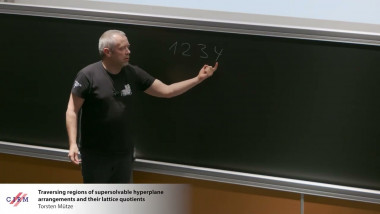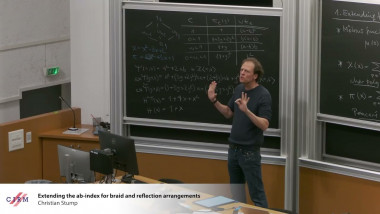
Traversing regions of supersolvable hyperplane arrangements and their lattice quotients
By Torsten Mütze

Extending the ab-index for braid and reflection arrangements
By Christian Stump
Appears in collection : Frieze patterns in algebra, combinatorics and geometry / Frises en algèbre, combinatoire et géométrie
The goal of this talk is to explore the connections between various frieze patterns and representation theory of associative algebras. We begin with the classical Conway- Coxeter friezes over positive integers and their correspondence with Jacobian algebras of type A, where entries in the frieze count the number of submodules of indecompos- able representations. This can also be reinterpreted in terms of applying the Caldero- Chapoton map, providing a close connection to Fomin-Zelevinsky's cluster algebras. Extending these ideas beyond the classical case, we will also discuss higher dimen- sional friezes, called (tame) SLk friezes, as well as their relation to cluster algebras on coordinate rings of Grassmannians Gr(k,n) and their categorification. Furthermore, SLk friezes are a special type of SLk tilings, integer tilings of the plane satisfying the condition that every k x k square has determinant 1. We will present a characterization of SLk tilings in terms of pairs of bi-infinite sequences in Zk and discuss applications to duality and positivity.
